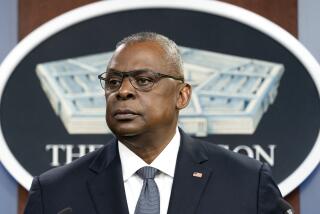Clinton Issues Muted National Security Report : Policy: The document includes watered-down versions of earlier White House pronouncements. It is distributed without fanfare.
- Share via
WASHINGTON — President Clinton unveiled his long-awaited national security strategy Thursday, outlining a broad approach to foreign policy issues decidedly more muted than the one he and his aides described during the early days of the Administration.
The 50-page document, distributed without fanfare after the normal workday, contained watered-down versions of earlier White House pronouncements on issues such as the use of military force, global peacekeeping and expansion of democracy around the world.
To rebut the growing criticism of the Administration’s foreign policy, the report also put forward a three-page list of Clinton accomplishments, including American support for economic reform in Russia, aid to Eastern Europe and completion of two free-trade agreements.
In a statement accompanying the report, Clinton said the document “charts a course for American leadership that has already begun to produce tangible results with respect for our security requirements.”
The document, required by a 1986 law, traditionally is sent to Congress earlier in an Administration, but the Clinton White House delayed it, partly to give the Pentagon time to complete an assessment of U.S. defense forces in September.
One reason the document was made public Thursday night, some officials suggested, was to counter a report on readiness that a special Pentagon commission is to issue today. That report says military preparedness cannot be fully assessed until the security strategy has been set.
As has been expected, most policies outlined in the report have been described in previous presidential statements and directives--often after the realities of world events forced the Administration to trim back its previous aims.
Clinton published a new, more conservative policy on American participation in global peacekeeping earlier this year, for example, after Congress balked at his more ambitious plans following the deaths of 18 U.S. Rangers as a result of a firefight in Somalia in October.
Reflecting Clinton’s view on the importance of the economy to the nation’s security, the document for the first time listed economic policy as a pillar of national security policy, along with continued global leadership and promotion of democracy.
While the White House continued to call for a military that is capable of winning “two nearly simultaneous major regional conflicts”--as the Pentagon’s review proposed in September--it conceded that could not be done without the weapons modernization it has planned.
The document also warned against isolationism, with Clinton asserting in an accompanying statement that the country could address post-Cold War dangers only “if we remain actively engaged in global affairs.”
With the national security strategy now out of the way, the Administration is expected to complete a national military strategy setting out broad goals and aims for the armed forces.
More to Read
Sign up for Essential California
The most important California stories and recommendations in your inbox every morning.
You may occasionally receive promotional content from the Los Angeles Times.













